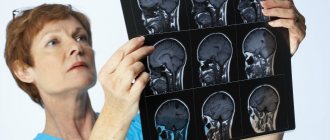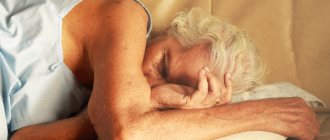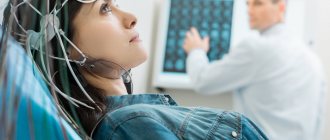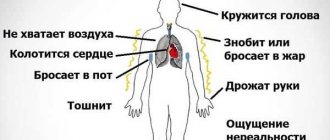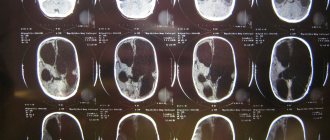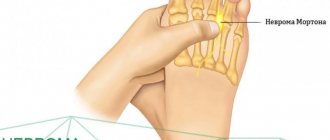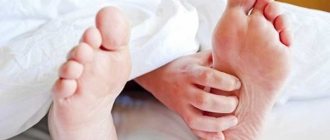Insomnia or insomnia is a sleep disorder that can be caused by external factors or severe psychosomatic diseases. Insomnia is characterized by unsatisfactory quality of sleep or its complete absence. Which doctor should I contact if I have insomnia and how can I get proper sleep back?
The need for rest is individual for each person. Newborn babies should sleep at least 14-16 hours a day; adults need 5-9 hours. If insomnia disrupts this regime, a person is worried about weakness, loss of strength, deterioration in general well-being and performance.
Description of the disease
Insomnia or insomnia is a pathological condition in which the duration of sleep decreases and it is difficult to fall asleep.
Sleep disturbance in patients is characterized by the following symptoms:
- Falling asleep takes 2 hours or more.
- Awakening occurs from minor sounds and light.
- Sleep is often interrupted not only by external factors, but also by internal ones. These include unpleasant dreams, the urge to urinate, and rapid heartbeat.
- Atypical early awakening around 4-5 am.
- Sleeping at night brings neither physical nor mental rest.
Risk group
Typically, insomnia occurs in the following people:
Almost every teenager has temporary sleep disturbances. The reason is hormonal changes, which lead to imbalance. People with night work schedules who often change time zones are also at risk. The problem also arises among suspicious people who take all problems to heart.
How to diagnose yourself
One sleepless night is not a reason to run to the doctor. The cause of isolated cases of insomnia can be stress, flight, or a disruption in the daily routine.
It is enough to adjust your working day, improve your diet and exercise so that your sleep brings satisfaction as before.
If insomnia bothers a person 1-2 times a week for 2 weeks or more, then you should seek advice from a specialist.
At the same time, the patient’s body is gradually “depleted”, which is reflected in several areas of life (social, physical, work).
You can independently diagnose insomnia using the following additional signs:
- regular headache, sharp rise or fall in blood pressure, chronic fatigue;
- irritability gives way to apathy and vice versa; anxiety level is increased;
- lack of pleasure from communicating with people;
- previously high performance decreases, inattention and forgetfulness become the “norm”.
Read about the dangers of insomnia and the health consequences it can lead to here.
Proper nutrition
Is it possible to eat at night? The answer is yes, but not all products. You should not eat foods rich in carbohydrates. With them, the production of insulin is accelerated, a signal is sent to the brain that it is not fat that needs to be burned, but glucose. Such products not only negatively affect your health, but also interfere with sleep.
To fall asleep easier, you need to be neither full nor hungry. This requires a light dinner 1 hour before bedtime. Kefir and fermented baked milk have a beneficial effect.
Honey helps with insomnia. The product contains tryptophan, an amino acid that causes drowsiness. Add 1 tsp to 1 glass of warm milk. honey The drug is drunk 15-30 minutes before bedtime. This elixir ensures deep and restful sleep.
Who to contact
Which doctor treats insomnia? First of all, a person with sleep complaints goes to a therapist. After a conversation with the patient, the doctor redirects him to a more specialized specialist.
Depending on the cause of insomnia, its treatment will be carried out by one or more doctors of different profiles (endocrinologist, pulmonologist).
In the presence of neurological diseases, the treatment regimen is determined by a neurologist . A psychologist, psychotherapist and psychiatrist will be needed if insomnia develops due to depression, stress or mental illness.
Prevention
It is much easier not to treat insomnia, but to engage in prevention. To do this, you should use several simple methods:
An excellent prevention is the use of herbal infusions. It is advisable to consult a doctor about which decoctions are beneficial and cause drowsiness.
A sewn pillow with herbs helps with insomnia. To do this, you will need several branches of dried valerian, lemon balm, and hawthorn. They are wrapped in natural fabric. The pad is placed next to the pillow. Plants have a positive effect on the body.
Diagnostic methods for men and women
The attending physician should review the patient's sleep history. The person describes to the specialist how long he sleeps and how quickly he falls asleep, what factors influence awakening.
The patient also indicates how often sleep disturbances occur and what their consequences are on activities during the day.
The doctor finds out the details of the daily routine and the presence of depressive conditions in the patient.
He should be aware of the patient's intake of certain medications (anticonvulsants, antidepressants, non-steroidal anti-inflammatory drugs).
It is possible to more accurately assess the nature and cause of sleep disorders using the diagnostic methods given below.
Testing
There are several diagnostic tests for insomnia:
- Multiple sleep latency test. The study is being conducted to separate physical fatigue and daytime sleepiness.
The patient spends a day in the clinic. Using polysomnography, the speed of falling asleep and the duration of each sleep phase are determined.To obtain reliable data, the patient is asked to sleep 4-5 times during the day with an interval of 2 hours.
- Physiological tests to assess the activity of the lungs and heart.
- Wakefulness test. The method helps to find out how long the patient can stay awake in a quiet room.
The test determines the severity of daytime sleepiness, as well as a person's ability to perform daily activities well.
Analyzes
A blood draw and hormone test can rule out or confirm thyroid disease.
With their help, it is possible to diagnose iron deficiency anemia and restless legs syndrome (vitamin B12 deficiency).
Surveys
- Polysomnography, which is performed in a hospital setting or at home. In the first case, the functioning of the human body during sleep is assessed in the clinic.
During this period, the doctor receives data on brain activity, heart rate, blood oxygen saturation, movement of the eyeballs and lower extremities. He also examines the depth and duration of sleep phases.If it is difficult for a patient to stay in the clinic, he is provided with a portable device. The device records the same data as a laboratory polysomnograph.
- CT and MRI help to assess the state of the brain layer by layer. This allows you to detect diseases that could cause insomnia.
Additional Methods
The Epworth Sleepiness Rating Scale is used to diagnose insomnia. It is used to detect the onset of drowsiness in the following situations: during a conversation, watching TV, after working without a break, reading newspapers. To obtain the result, a 4-point system is used.
The doctor may advise the patient to keep a sleep diary for a month. The patient records sleep patterns, periods of wakefulness, bad habits (snoring).
This way the specialist will receive more information about the problem and will be able to track the effectiveness of treatment.
Treatment methods for insomnia
Treatment of insomnia should not be limited to the use of sleeping pills. Sleeping pills may help you fall asleep, but they do not address the cause of your insomnia. In some cases, sleeping pills simply cannot be used. If the cause of insomnia is breathing problems, the person should be able to wake up so that breathing can be restored. Also, sleeping pills are excluded during pregnancy and breastfeeding.
Effective treatment of insomnia is possible only after identifying its causes. Diagnosis and treatment of insomnia in Moscow is carried out at the Rehabilitation Center.
If you are worried about insomnia, it is best to first consult a general practitioner ([anchor href=»www.fdoctor.ru/semeynyy-vrach/»]family doctor or therapist). If a psychogenic origin of insomnia is identified, you will need to consult a neurologist or psychotherapist.
In most cases, treating insomnia requires a comprehensive approach. Methods that can be used include:
Sleeping pills
It is not advisable to resort to using sleeping pills on your own. Sleeping pills must be prescribed by a doctor. Typically, the course of taking sleeping pills ranges from 3 days to 2 weeks. When taken for a long time, these drugs lose effectiveness and stop helping. If you feel that the drug is not helping you well, do not increase the dose under any circumstances, but you should also not suddenly stop taking it: otherwise your insomnia will only worsen. It is necessary to consult a doctor who will adjust the course of administration or replace the drug.
Electroson
The method is as follows. With the help of weak pulsed currents of low frequency, directed through electrodes placed on the eyelids, an inhibitory effect is exerted on the nervous system. The patient enters a sleep-like state. The procedure has a calming effect, has a positive effect on blood quality, and improves cerebral circulation.
Physiotherapy
Among the methods of hardware physiotherapy, along with electrosleep, magnetic therapy and darsonvalization of the head and collar area are used in the treatment of insomnia.
More information about the treatment method
Massage
For insomnia, a relaxing and soothing massage is recommended
More information about the treatment method
Reflexology
Reflexology can be used in combination with other methods of treating insomnia.
More information about the treatment method
Behavioral therapy
Behavioral therapy includes a set of recommendations that change the pattern of going to sleep. Usually they include stimulus control (you should go to bed with the goal of falling asleep) and limiting the amount of sleep (you should not lie in bed if you are not sleeping).
Make an appointment Do not self-medicate. Contact our specialists who will correctly diagnose and prescribe treatment.
Rate how useful the material was
thank you for rating
What is the diagnosis based on?
The diagnosis of “primary insomnia,” that is, one that is not associated with any somatic or mental illness, is made based on the following factors:
- Difficulty falling asleep and lack of rest after sleep have been present for a month.
- Sleep disturbances cause discomfort in everyday life (fatigue, absent-mindedness).
- Insomnia is not observed when the respiratory and cardiovascular systems are impaired.
- Sleep problems are not caused by taking medications or drugs.
- Insomnia is not a consequence of delirium, generalized anxiety disorder or other mental disorders.
Insomnia is a widespread problem that, at first glance, can be dealt with on your own.
However, the use of traditional methods, popular drugs, and even more so alcohol, does not solve the root causes of insomnia.
A person wastes time and aggravates his situation. Early diagnosis of insomnia will make it possible to determine the cause of its occurrence and cope with it using proven methods.
What happens in a dream?
You may be interested in: How many calories are burned during sleep: calculation per hour and per night
During sleep, minimal brain activity occurs, and the reaction to stimuli from the outside world is reduced. Physiological sleep differs from coma, fainting, hypnotic trance, suspended animation, and lethargic sleep.
During sleep:
What should you do if you experience insomnia? The reasons for this phenomenon must be identified. This affects treatment methods.
What are the dangers of sleep disturbance?
This condition can lead to complications. If there are no timely therapeutic procedures, the following pathologies will develop:
- memory deteriorates greatly;
- diseases of the heart muscle appear;
- the nervous system suffers, which leads to neuroses and psychoses;
- weight increases;
- the functioning of the immune system is disrupted;
- diabetes mellitus develops.
Sleep disturbances worsen chronic diseases. Therefore, if you have this condition, you should consult a doctor. Timely and effective treatment will improve well-being, relieving a person of insomnia.
Source




